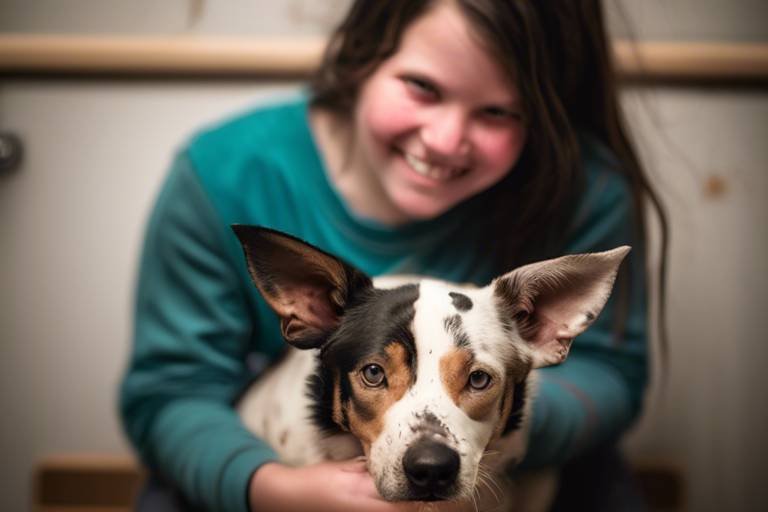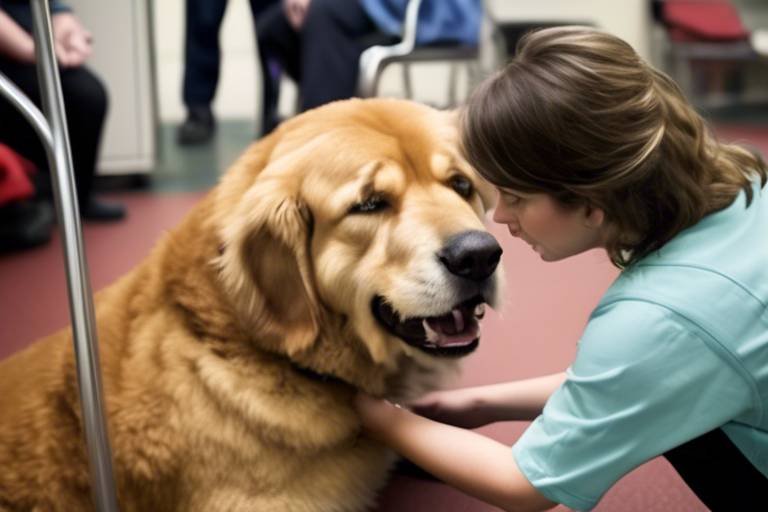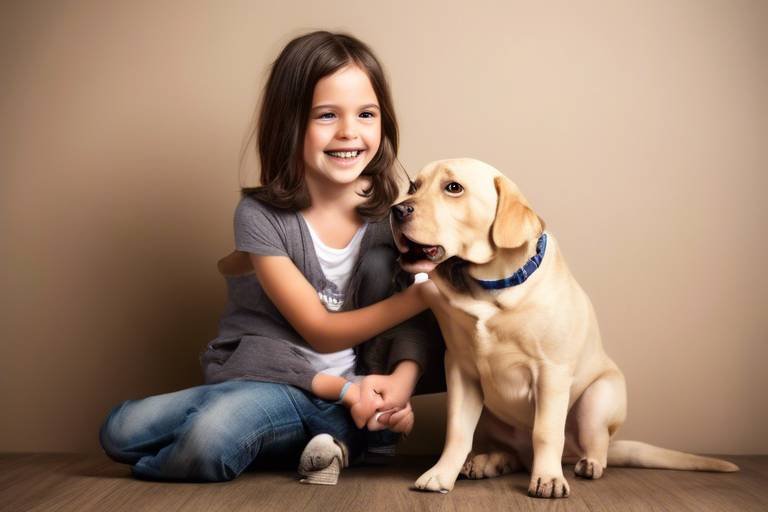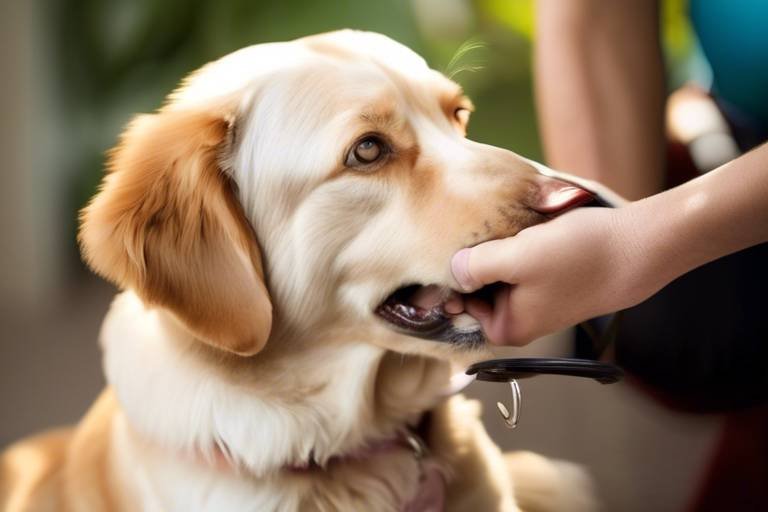The Benefits of Adopting a Pet for Your Lifestyle
Have you ever thought about how much joy a furry friend could bring to your life? Adopting a pet is not just about having a cute companion; it’s about enriching your entire lifestyle. Pets are like little bundles of happiness that can transform your daily routine into something extraordinary. From emotional support to physical health benefits, the advantages of bringing a pet into your home are endless. Let’s dive into the incredible ways that adopting a pet can enhance your overall well-being and make life a whole lot brighter!
Pets provide unconditional love and companionship that can significantly reduce feelings of loneliness and anxiety. Imagine coming home after a long day, and there’s your dog, wagging its tail and ready to greet you with joy. Their mere presence can enhance mental health, making them invaluable for emotional well-being. Studies have shown that having a pet can boost your mood and even increase levels of serotonin and dopamine, the brain's feel-good chemicals. It’s like having a personal cheerleader who’s always there to lift your spirits!
Did you know that owning a pet can lead to increased physical activity? It’s true! Regular walks and playtime with your furry friend contribute to a healthier lifestyle and can even lower blood pressure. When you adopt a pet, particularly a dog, you’re not just gaining a companion; you’re also gaining a workout buddy! Here’s how:
Having a dog encourages you to get outside and enjoy the fresh air. Whether it’s a brisk walk around the neighborhood or a game of fetch in the park, these activities promote a more active lifestyle. This not only benefits the pet but also helps you maintain your fitness levels. Think of it as a fun way to combine exercise with quality time spent with your best friend!
Walking a dog or visiting pet parks can foster social connections among pet owners. It’s amazing how a simple stroll can lead to new friendships! You might find yourself chatting with fellow dog lovers, sharing tips, or even planning playdates. These interactions enhance community ties and can make you feel more connected to those around you.
Caring for a pet establishes a daily routine, which can enhance time management skills and provide a sense of purpose. For individuals who may feel lost or overwhelmed, having a pet can create a structure to your day. You’ll find yourself waking up at the same time each morning to feed your furry friend, which can lead to a more organized lifestyle overall.
Interacting with pets has been shown to lower cortisol levels, leading to reduced stress and anxiety. The simple act of petting an animal can release endorphins, promoting relaxation. Picture this: after a hectic day, you sit down with your cat purring on your lap. It’s like a warm hug that melts your worries away!
Adopting a pet instills a sense of responsibility, especially in children. Caring for an animal teaches valuable life skills, such as empathy, commitment, and nurturing. It’s like having a mini life coach right at home! Children learn to be accountable for another living being, which can shape their character and values.
Pets can serve as excellent teachers for children, helping them understand concepts like empathy, patience, and the importance of caring for another living being. By nurturing a pet, kids learn to recognize the needs of others, which is a fundamental life skill that will serve them well in the future.
Caring for a pet together can strengthen family bonds and create shared experiences. Whether it’s feeding, walking, or playing, these activities foster teamwork and communication among family members. It’s a beautiful way to bring everyone together and create lasting memories!
Pets can play a crucial role in enhancing mental health by providing companionship, reducing feelings of depression, and offering a sense of purpose. Their unconditional love can be incredibly therapeutic. Just think about how comforting it is to have a furry friend by your side during tough times!
Having a pet creates a daily routine that can provide stability and predictability. This is particularly beneficial for individuals dealing with anxiety or depression. Knowing that you have a pet to care for can give you a sense of direction and motivation to get out of bed each day.
Caring for a pet encourages mindfulness, as it requires attention to the pet's needs and behaviors. This helps owners stay present and engaged in the moment. It’s like a gentle reminder to slow down and appreciate the little things in life, like a wagging tail or a soft purr.
- What are the best pets for families? Dogs and cats are popular choices, but small animals like rabbits and guinea pigs can also be great for families.
- How do I choose the right pet for my lifestyle? Consider your activity level, living situation, and how much time you can dedicate to a pet.
- Can pets really improve my mental health? Yes! Many studies show that pets can reduce anxiety and depression and increase feelings of happiness and companionship.
- What if I have allergies? There are hypoallergenic breeds of dogs and cats, as well as other pets like reptiles or fish that may be suitable.

Emotional Support
Imagine coming home after a long, stressful day, feeling the weight of the world on your shoulders. Now, picture a furry friend bounding towards you, tail wagging, eyes sparkling with joy. This is the magic of pets—they provide an unparalleled sense of that can transform your life. Pets offer unconditional love and companionship, creating a warm and inviting atmosphere that significantly reduces feelings of loneliness and anxiety. Their mere presence can elevate your mood, making them invaluable allies in the quest for emotional well-being.
Studies have shown that interacting with pets can lead to the release of oxytocin, the hormone associated with bonding and affection. This biological response not only enhances your mood but also promotes feelings of happiness and contentment. In moments of distress, having a pet nearby can serve as a soothing balm, helping to alleviate feelings of sadness or anxiety. Whether it’s a gentle purr from a cat or the playful antics of a dog, pets have an innate ability to lift our spirits.
Furthermore, the act of caring for a pet fosters a deep emotional connection. This bond can be especially beneficial for individuals who may struggle with mental health issues. For instance, those battling depression often find solace in the routine of pet care, which can provide a much-needed sense of purpose. When you have someone (or something) that relies on you, it can ignite a spark of motivation and responsibility that might otherwise be lacking.
Moreover, pets can act as a bridge to social connections. When you walk your dog in the neighborhood or visit a local pet park, you’re likely to encounter other pet owners. These interactions can foster friendships and create a sense of community, further enhancing your emotional support network. It’s a beautiful cycle—pets not only provide companionship but also facilitate connections with others, enriching your social life.
In summary, the emotional support provided by pets is multifaceted. From reducing loneliness and anxiety to fostering social interactions, pets can significantly enhance your emotional well-being. Their unconditional love and companionship can be a lifeline, helping you navigate the ups and downs of life with a little more ease and a lot more joy.
- How do pets help with anxiety? Pets provide companionship and a sense of purpose, which can alleviate feelings of anxiety and loneliness.
- Can pets really improve mental health? Yes! Interacting with pets has been shown to reduce symptoms of depression and anxiety.
- What types of pets are best for emotional support? Dogs and cats are the most common, but other animals like rabbits or birds can also provide companionship.

Physical Health Benefits
This article explores the various advantages of bringing a pet into your life, from emotional support to physical health benefits, and how they can enhance your overall well-being.
Pets provide unconditional love and companionship, significantly reducing feelings of loneliness and anxiety. Their presence can enhance mental health, making them invaluable for emotional well-being.
Owning a pet can lead to a myriad of that not only improve your overall well-being but also encourage a more active lifestyle. One of the most notable advantages is the increase in physical activity that comes with pet ownership. For instance, dog owners often find themselves taking regular walks, which not only benefits their furry friends but also promotes cardiovascular health. In fact, studies have shown that pet owners are more likely to engage in daily exercise compared to non-pet owners.
Additionally, the act of playing with your pet—whether it's tossing a ball or engaging in a game of fetch—can significantly contribute to your daily physical activity levels. This playful interaction is not just fun; it can also help in lowering blood pressure and reducing the risk of heart disease. Imagine your heart pumping with excitement as you run alongside your dog in the park; it's a win-win situation!
Moreover, having a pet can create a sense of routine that encourages regular exercise. For many, the responsibility of walking a dog becomes a daily ritual that enhances their fitness levels. The following table summarizes some of the key physical health benefits linked to pet ownership:
| Benefit | Description |
|---|---|
| Increased Activity | Regular walks and playtime boost physical fitness. |
| Improved Cardiovascular Health | Lower blood pressure and reduced risk of heart disease. |
| Enhanced Mental Well-being | Physical activity linked to reduced anxiety and depression. |
Having a dog is like having a personal trainer who never lets you skip a workout! Dogs are naturally energetic and require regular exercise, which means their owners are encouraged to get moving too. This shared activity not only benefits the pet but also helps owners maintain their fitness levels. Think of it as a partnership where both you and your pet strive for health together. Plus, who wouldn't want to enjoy the great outdoors while getting fit?
Walking a dog or visiting pet parks can foster social connections among pet owners. It's amazing how a simple stroll can lead to new friendships! You might find yourself chatting with fellow dog lovers, sharing tips, or even arranging playdates for your pets. These interactions can enhance community ties and create a supportive network of fellow pet owners who share your passion.
Caring for a pet establishes a daily routine, which can enhance time management skills and provide a sense of purpose, especially for individuals who may feel lost. The responsibility of feeding, walking, and playing with a pet creates a structured schedule that can be incredibly beneficial for mental health. It’s like having a built-in accountability partner who reminds you to stay active and engaged in life.
Interacting with pets has been shown to lower cortisol levels, leading to reduced stress and anxiety. The simple act of petting an animal can release endorphins, promoting relaxation. Imagine coming home after a long day, and your furry friend greets you with enthusiasm; that moment alone can melt away the stress of the day!
Adopting a pet instills a sense of responsibility, especially in children. Caring for an animal teaches valuable life skills, such as empathy, commitment, and nurturing.
Pets can serve as excellent teachers for children, helping them understand concepts like empathy, patience, and the importance of caring for another living being.
Caring for a pet together can strengthen family bonds and create shared experiences, fostering teamwork and communication among family members.
Pets can play a crucial role in enhancing mental health by providing companionship, reducing feelings of depression, and offering a sense of purpose. Their unconditional love can be incredibly therapeutic.
Having a pet creates a daily routine that can provide stability and predictability, which is particularly beneficial for individuals dealing with anxiety or depression.
Caring for a pet encourages mindfulness, as it requires attention to the pet's needs and behaviors, helping owners stay present and engaged in the moment.
- What are the benefits of having a pet? Pets provide emotional support, encourage physical activity, and can improve mental health.
- How do pets help with stress? Interacting with pets can lower cortisol levels and promote relaxation.
- Can pets teach children responsibility? Yes, caring for a pet teaches children valuable life skills like empathy and commitment.
Encouragement for Exercise
When you bring a dog into your life, you’re not just gaining a furry friend; you’re also gaining a personal trainer that never tires! Dogs have an amazing ability to motivate their owners to get off the couch and hit the great outdoors. Imagine this: it’s a sunny Saturday morning, and your pup is staring at you with those big, pleading eyes, tail wagging furiously. How can you resist? This simple act of companionship translates into regular outdoor activities, which are essential for maintaining a healthy lifestyle.
In fact, studies show that dog owners are significantly more likely to meet their daily exercise requirements compared to non-pet owners. It’s not just about the walks; it’s about the joy and excitement of playing fetch, going for hikes, or simply exploring the neighborhood together. Every time you toss a ball or take a stroll, you’re not only keeping your dog happy but also getting your heart rate up and burning those calories. It’s a win-win situation!
Here’s a little breakdown of how owning a dog encourages a more active lifestyle:
| Activity | Benefits |
|---|---|
| Daily Walks | Improves cardiovascular health and enhances mood |
| Playing Fetch | Boosts physical activity levels and strengthens the bond with your pet |
| Hiking | Increases stamina and allows for exploration of nature |
| Dog Parks | Encourages social interaction with other pet owners and pets |
Moreover, the routine of walking your dog can help establish a consistent exercise schedule. You might find yourself looking forward to your daily outings, enjoying the fresh air, and even meeting fellow dog lovers along the way. This social aspect of dog ownership can make exercising feel less like a chore and more like an enjoyable part of your day. Plus, who doesn’t love a good excuse to get outside and soak up some sunshine?
So, if you're looking for that extra push to get moving, adopting a dog might just be the best decision you ever make. Not only will you be improving your health and fitness, but you'll also be enriching your life with joy, companionship, and a little bit of playful chaos!
- How much exercise does a dog need? - Most dogs require at least 30 minutes to 2 hours of exercise each day, depending on their breed and energy level.
- Can I exercise my dog indoors? - Yes! Activities like playing fetch in a hallway or using interactive toys can help keep your dog active indoors.
- What if I’m not very active myself? - Start slow! Even short walks can be beneficial, and gradually increasing your activity level can help both you and your pet.
- Are there specific breeds that require more exercise? - Yes, high-energy breeds like Border Collies and Labrador Retrievers typically need more exercise than smaller, less active breeds.
Social Interaction
When you adopt a pet, you’re not just inviting a furry friend into your home; you’re also opening the door to a world of social interaction. Imagine this: you’re out for a walk, and your dog suddenly spots another canine companion. Instantly, you find yourself chatting with another dog owner, sharing stories about your pets, and forming a connection that might not have happened otherwise. It’s like having a social icebreaker right at your feet! Pets naturally draw people together, creating opportunities for conversations and friendships that can enrich your life.
But it’s not just about casual chats during walks. Pet parks are vibrant hubs of social activity where pet owners gather, share tips, and bond over their mutual love for animals. These parks often become a community gathering place, where people of all ages come together, united by their furry companions. In fact, studies show that pet owners are more likely to engage with one another, leading to stronger community ties. It’s a beautiful cycle: the more you interact with others, the more your social network grows, and the more fulfilling your life becomes.
Additionally, pets can help bridge the gap between generations. Whether you’re a young adult or a senior citizen, having a pet can foster connections with others in your age group or even different generations. For instance, grandparents can bond with their grandchildren over a shared love for a family pet, creating memories that last a lifetime. In this way, pets serve not just as companions, but as facilitators of relationships that enhance our lives.
Moreover, pets have a unique ability to create a sense of belonging. When you’re part of a pet community—whether it’s through local clubs, online forums, or social media groups—you’re surrounded by like-minded individuals who share your passion. This sense of community can be incredibly supportive, especially for those who may feel isolated or lonely. Being part of a group that celebrates the joys and challenges of pet ownership can provide emotional support and camaraderie, reinforcing the idea that you’re never alone in your journey.
In summary, adopting a pet is not just about gaining a loyal companion; it’s about enhancing your social life and fostering connections that can lead to lasting friendships. So, the next time you’re out with your pet, take a moment to appreciate the connections you’re making. Who knows? You might just meet your next best friend!
- How can pets improve my social life? Pets naturally attract attention and can serve as conversation starters, helping you meet new people and form connections.
- Are there specific types of pets that encourage more social interaction? Dogs, especially, tend to be more social and require outdoor activities that often lead to interactions with other pet owners.
- Can pets help me feel less lonely? Yes! Pets provide companionship and can help reduce feelings of loneliness by offering unconditional love and support.
- What are some ways to meet other pet owners? Visiting pet parks, joining pet-related clubs, and participating in community events can help you connect with other pet lovers.
Routine and Structure
Caring for a pet brings a much-needed sense of routine and structure into our lives. Imagine waking up each morning to the soft nudging of your furry friend, reminding you that it’s time to rise and shine. This daily ritual not only helps you start your day on a positive note but also instills a sense of accountability. Pets thrive on consistency, and in turn, they encourage their owners to establish a more organized lifestyle. Whether it’s feeding, walking, or playtime, these responsibilities create a rhythm that can make even the busiest of lives feel more manageable.
For many people, especially those who may feel lost or overwhelmed, having a pet can provide a clear purpose. The simple act of caring for another living being can ignite a spark of motivation that may have been missing. You find yourself planning your day around your pet’s needs, which can lead to better time management skills. It’s akin to having a built-in schedule that not only benefits your pet but also helps you prioritize your own tasks effectively.
Moreover, the structure that comes with pet ownership can be particularly beneficial for children. They learn to anticipate their pet’s needs and develop a routine that includes responsibilities such as feeding, grooming, and exercising their furry companions. This not only teaches them valuable life skills but also fosters a sense of empathy and commitment. Children who engage in these routines often find that they feel more secure and stable, which can be incredibly beneficial for their emotional development.
To illustrate the impact of routine and structure, consider the following table that outlines a typical daily schedule for a pet owner:
| Time | Activity |
|---|---|
| 7:00 AM | Wake up and feed the pet |
| 7:30 AM | Morning walk or playtime |
| 12:00 PM | Midday check-in and play |
| 5:00 PM | Evening walk |
| 7:00 PM | Dinner time |
| 9:00 PM | Wind down and cuddle time |
This structured approach not only benefits the pet but also helps the owner feel accomplished at the end of the day. It’s a powerful reminder that even amidst chaos, we can find stability through the simple joys of pet ownership. So, if you’re considering bringing a pet into your life, remember that the routine you establish can lead to a more fulfilling and organized existence for both you and your furry friend.
- How does having a pet improve my daily routine? Pets require regular care, which helps you establish a consistent daily schedule.
- Can pets help with anxiety and stress? Yes, interacting with pets can significantly reduce stress and anxiety levels.
- What responsibilities come with pet ownership? Responsibilities include feeding, walking, grooming, and providing companionship.
- Is it beneficial for children to have pets? Absolutely! Pets teach children empathy, responsibility, and nurturing skills.
Stress Reduction
Interacting with pets is like having a built-in stress relief system right in your home. It’s no secret that life can throw some pretty hefty curveballs our way, leaving us feeling overwhelmed and anxious. But guess what? Those furry friends of ours have a magical way of turning that stress into a distant memory. Just think about it: when you come home after a long, tough day, what’s the first thing you want to do? If you’re like most people, you probably want to snuggle with your pet. That simple act can instantly lift your mood!
Research shows that spending time with pets can significantly lower cortisol levels, which is the hormone associated with stress. Imagine petting your dog or cat; as your hand runs through their fur, your worries start to fade. This isn’t just a coincidence! The act of petting releases endorphins, those lovely little chemicals in our brains that promote feelings of happiness and relaxation. It’s like a natural antidepressant that comes with a wagging tail or a gentle purr!
Furthermore, pets provide a comforting presence that can help ease anxiety. For many, the unconditional love and companionship they offer can make a world of difference. They don’t judge, they don’t criticize; they simply love you for who you are. This can lead to a more positive self-image and improved emotional resilience. In fact, studies have shown that pet owners often report feeling less lonely and more connected to the world around them. Here’s a quick breakdown of how pets can help reduce stress:
- Physical Touch: The simple act of petting can calm your nerves.
- Companionship: Pets provide a non-judgmental presence that can help alleviate feelings of loneliness.
- Routine: Caring for a pet creates a sense of structure and purpose in your day.
- Mindfulness: Focusing on your pet’s needs encourages you to be present in the moment.
Moreover, the companionship of a pet not only helps in reducing stress but also enhances overall well-being. Just think about how many times you’ve seen someone smile at a dog in a park or heard laughter from a family playing with their cat. These moments create connections, not just between humans and animals, but also among people. They spark conversations, foster friendships, and build communities. So, when you adopt a pet, you’re not just bringing home an animal; you’re opening the door to a whole new world of social interactions and emotional support.
In essence, the presence of a pet can transform your home into a sanctuary of peace and joy. They remind us to take life a little less seriously and to enjoy the little things, like a sunny afternoon or a cozy cuddle session. So, if you’re feeling the weight of the world on your shoulders, consider adding a furry companion to your life. They might just be the perfect antidote to your stress!
- How do pets help reduce stress? Pets provide companionship, promote physical touch, and encourage mindfulness, all of which can significantly lower stress levels.
- Can pets improve mental health? Yes, pets offer unconditional love and support, which can help alleviate feelings of anxiety and depression.
- What types of pets are best for stress relief? Dogs and cats are commonly known for their stress-relieving qualities, but small pets like rabbits and guinea pigs can also provide comfort.
- How much time should I spend with my pet to feel the benefits? Even short interactions, like a few minutes of petting or playing, can have positive effects on your stress levels.
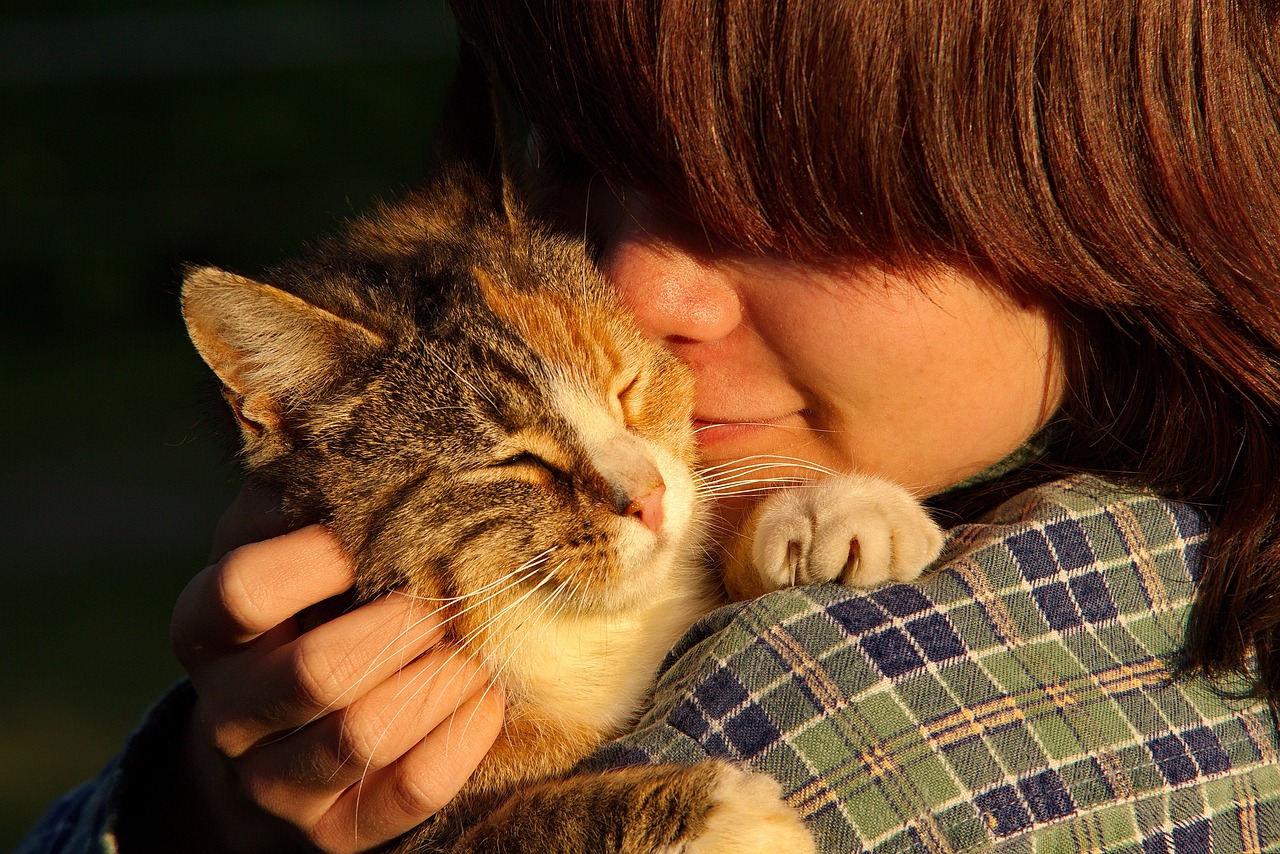
Teaching Responsibility
This article explores the various advantages of bringing a pet into your life, from emotional support to physical health benefits, and how they can enhance your overall well-being.
Pets provide unconditional love and companionship, significantly reducing feelings of loneliness and anxiety. Their presence can enhance mental health, making them invaluable for emotional well-being.
Owning a pet can lead to increased physical activity and improved cardiovascular health. Regular walks and playtime contribute to a healthier lifestyle and can even lower blood pressure.
Having a dog encourages regular outdoor activities, promoting a more active lifestyle. This not only benefits the pet but also helps owners maintain their fitness levels.
Walking a dog or visiting pet parks can foster social connections among pet owners, enhancing community ties and creating opportunities for new friendships.
Caring for a pet establishes a daily routine, which can enhance time management skills and provide a sense of purpose, especially for individuals who may feel lost.
Interacting with pets has been shown to lower cortisol levels, leading to reduced stress and anxiety. The simple act of petting an animal can release endorphins, promoting relaxation.
Adopting a pet instills a sense of responsibility, especially in children. Caring for an animal teaches valuable life skills, such as empathy, commitment, and nurturing. When children take on the task of looking after a pet, they learn to prioritize the needs of another living being over their own immediate desires. This process is akin to planting a seed that grows into a tree of responsibility, branching out into various aspects of their lives.
For instance, children learn to:
- Feed the pet regularly, which teaches them about the importance of nutrition and routine.
- Groom and clean their pets, instilling a sense of hygiene and care.
- Take the pet for walks, promoting physical activity and time management.
These tasks might seem simple, but they carry profound implications for a child's development. They begin to understand that every action has consequences, and they become more aware of the needs and feelings of others. Furthermore, this responsibility can foster a sense of pride and accomplishment when they see their pet thrive under their care. In essence, a pet can be a child’s first real experience with responsibility, setting the stage for future endeavors.
Pets can serve as excellent teachers for children, helping them understand concepts like empathy, patience, and the importance of caring for another living being. Observing a pet's behavior can prompt discussions about feelings and needs, encouraging kids to think beyond themselves. For example, when a dog is anxious during a thunderstorm, children can learn to recognize and respond to emotional cues, a skill that will serve them well in human relationships as they grow.
Caring for a pet together can strengthen family bonds and create shared experiences, fostering teamwork and communication among family members. Whether it’s taking turns to feed the pet or collaborating on training sessions, these activities can enhance family dynamics. The shared responsibility of pet care can transform into cherished memories, reinforcing the idea that working together yields rewarding results.
Pets can play a crucial role in enhancing mental health by providing companionship, reducing feelings of depression, and offering a sense of purpose. Their unconditional love can be incredibly therapeutic.
Having a pet creates a daily routine that can provide stability and predictability, which is particularly beneficial for individuals dealing with anxiety or depression.
Caring for a pet encourages mindfulness, as it requires attention to the pet's needs and behaviors, helping owners stay present and engaged in the moment.
- What are the best pets for children? Dogs and cats are popular choices, but smaller pets like rabbits or guinea pigs can also be great for younger kids.
- How can I teach my child to care for a pet? Start with simple tasks like feeding and grooming, and gradually involve them in more responsibilities as they grow.
- What if my child is allergic to pets? Consider hypoallergenic breeds or smaller pets that may cause fewer allergic reactions.
Life Lessons for Children
This article explores the various advantages of bringing a pet into your life, from emotional support to physical health benefits, and how they can enhance your overall well-being.
Pets provide unconditional love and companionship, significantly reducing feelings of loneliness and anxiety. Their presence can enhance mental health, making them invaluable for emotional well-being.
Owning a pet can lead to increased physical activity and improved cardiovascular health. Regular walks and playtime contribute to a healthier lifestyle and can even lower blood pressure.
Having a dog encourages regular outdoor activities, promoting a more active lifestyle. This not only benefits the pet but also helps owners maintain their fitness levels.
Walking a dog or visiting pet parks can foster social connections among pet owners, enhancing community ties and creating opportunities for new friendships.
Caring for a pet establishes a daily routine, which can enhance time management skills and provide a sense of purpose, especially for individuals who may feel lost.
Interacting with pets has been shown to lower cortisol levels, leading to reduced stress and anxiety. The simple act of petting an animal can release endorphins, promoting relaxation.
Adopting a pet instills a sense of responsibility, especially in children. Caring for an animal teaches valuable life skills, such as empathy, commitment, and nurturing.
Pets can serve as excellent teachers for children, helping them understand concepts like empathy, patience, and the importance of caring for another living being. When children engage in the daily responsibilities of pet care, they learn that their actions have consequences. For instance, if they forget to feed their pet, they witness firsthand how it affects the animal's well-being. This tangible connection between action and consequence is a powerful lesson in accountability.
Moreover, the bond formed between a child and their pet can be incredibly enriching. It teaches children about compassion and the significance of nurturing relationships. Through playtime, feeding, and grooming, kids develop a sense of commitment and learn how to prioritize the needs of another living creature. These experiences not only enhance their emotional intelligence but also foster a lifelong love for animals.
Additionally, caring for a pet together as a family can strengthen family bonds and create shared experiences. This teamwork in pet care can enhance communication and collaboration among family members, making it a fun and fulfilling journey. Children learn to work together, whether it's taking turns walking the dog or sharing the responsibility of cleaning the litter box. These moments create lasting memories and teach valuable lessons about cooperation and teamwork.
Pets can play a crucial role in enhancing mental health by providing companionship, reducing feelings of depression, and offering a sense of purpose. Their unconditional love can be incredibly therapeutic.
Having a pet creates a daily routine that can provide stability and predictability, which is particularly beneficial for individuals dealing with anxiety or depression.
Caring for a pet encourages mindfulness, as it requires attention to the pet's needs and behaviors, helping owners stay present and engaged in the moment.
- What are the best pets for children? Dogs and cats are popular choices, but small animals like hamsters or rabbits can also be great companions.
- How can pets help with anxiety? Pets provide comfort and companionship, which can significantly reduce feelings of anxiety and loneliness.
- What responsibilities do children have when caring for a pet? Children can help with feeding, walking, grooming, and cleaning up after their pets, which teaches them valuable life skills.
- Can pets really improve mental health? Yes, studies show that pets can alleviate feelings of depression and anxiety, providing emotional support and companionship.
Bonding Opportunities
When you adopt a pet, you're not just bringing an animal into your home; you're creating a unique opportunity for bonding that can strengthen relationships within your family. Imagine this: a furry friend who not only needs your care but also encourages teamwork and communication among family members. Whether it’s feeding, grooming, or simply playing together, these shared responsibilities can enhance your family dynamics in profound ways.
Engaging in pet care activities can lead to memorable moments. For instance, taking your dog for a walk can become a family event where everyone participates, sharing stories and laughter along the way. It’s not just about the exercise; it’s about the connections you forge during these moments. Similarly, training a puppy can be an adventure that requires everyone’s input, teaching patience and collaboration as you work together to teach your new friend some tricks.
Moreover, the presence of a pet can create a sense of unity. When family members come together to care for a pet, they often find common ground and shared interests. This can lead to deeper conversations and a better understanding of each other’s feelings and needs. Pets can act as a bridge, helping to facilitate discussions that might not happen otherwise. It’s as if they have a magical ability to draw people closer together, fostering an environment of love and support.
Additionally, pets can help alleviate stress during challenging times. For example, during family disagreements or tough days, the simple act of playing with or petting your furry companion can lighten the mood. It’s hard to stay upset when a wagging tail or a soft purr is nearby, reminding everyone of the joy and comfort that comes from unconditional love. This emotional support can transform a tense atmosphere into one filled with warmth and understanding.
In essence, adopting a pet is not just about adding a new member to your household; it’s about enriching your family life and creating opportunities for bonding that can last a lifetime. The experiences you share with your pet can become cherished memories that you and your family will treasure forever.
- How can pets improve family dynamics?
Pets can foster teamwork and communication among family members, creating shared responsibilities and memorable experiences. - What activities can families do with their pets?
Families can engage in walks, training sessions, grooming, and playtime, all of which strengthen bonds and encourage interaction. - Can pets help during stressful times?
Yes, pets provide emotional support and can help lighten the mood during family disagreements or tough days.

Improved Mental Health
When it comes to our mental health, the impact of pets can be nothing short of miraculous. Imagine coming home after a long, exhausting day, and there, waiting for you, is a wagging tail or a gentle purr. This simple act of companionship can significantly enhance your mood and make you feel less alone. Pets have an incredible ability to provide companionship that can alleviate feelings of loneliness and depression. Studies have shown that interacting with animals can lead to a reduction in symptoms of anxiety and depression, making them invaluable for emotional support.
In fact, research suggests that the presence of pets can lead to a noticeable improvement in mental well-being. When you pet an animal, your body releases endorphins, which are natural stress relievers. This biological response can create a calming effect, making your worries seem smaller and more manageable. Furthermore, the routine of caring for a pet instills a sense of purpose. You wake up each day knowing that your furry friend relies on you, which can be incredibly grounding for those who might feel lost or aimless.
Moreover, pets encourage a healthy lifestyle that contributes to better mental health. For instance, dog owners often find themselves taking regular walks, which not only benefits their physical health but also allows for exposure to the outdoors. Nature has a profound impact on our mental state; it promotes feelings of peace and tranquility. As you stroll through the park with your dog, you’re not just exercising, but also soaking in the beauty around you, which can elevate your mood.
Additionally, the act of caring for a pet can teach important life skills that enhance mental resilience. For children, pets serve as excellent teachers of empathy and responsibility. They learn to recognize the needs of another living being, which fosters a sense of connection and compassion. This nurturing experience can lead to greater emotional intelligence as they grow. As adults, we can also benefit from these lessons. Caring for a pet can remind us of the importance of patience and the joy of nurturing, which are essential skills for maintaining healthy relationships.
To illustrate the positive effects pets can have on mental health, consider the following table:
| Benefit | Description |
|---|---|
| Reduced Anxiety | Pets provide comfort and companionship, helping to lower anxiety levels. |
| Increased Happiness | Interactions with pets can boost mood and create feelings of joy. |
| Enhanced Social Connections | Owning a pet can lead to new friendships and connections with other pet owners. |
| Sense of Purpose | Caring for a pet provides a daily routine and a sense of responsibility. |
In conclusion, the benefits of having a pet extend far beyond companionship. They can significantly improve mental health by reducing feelings of loneliness, providing a sense of purpose, and even encouraging physical activity, all of which contribute to a happier, healthier life. So, if you’re considering bringing a pet into your home, know that you’re not just gaining a companion; you’re also investing in your mental well-being.
- How do pets help with anxiety? Pets provide comfort and companionship, which can help reduce anxiety levels and create a sense of calm.
- Can pets improve mood? Yes! Interacting with pets can trigger the release of endorphins, leading to increased feelings of happiness.
- What are the benefits of having a pet for children? Pets teach children empathy, responsibility, and nurturing skills, which are essential for their emotional development.
- Do pets help with depression? Many studies show that pets can alleviate symptoms of depression by providing companionship and a sense of purpose.
Routine and Stability
Having a pet introduces a wonderful sense of routine and stability into your life. Imagine waking up every morning to a wagging tail or a gentle purr; it’s like having a natural alarm clock that ensures you start your day on a positive note. This daily structure can be especially beneficial for individuals who struggle with anxiety or depression, as it provides a sense of purpose and direction. When you know you have a furry friend relying on you, it can motivate you to get out of bed and tackle the day ahead.
Pets thrive on routine, and by caring for them, you inadvertently establish a schedule that can enhance your own time management skills. For example, feeding, walking, and playing with your pet at consistent times creates a rhythm that can spill over into other aspects of your life. This structured environment not only benefits the pet but also helps you develop a more organized lifestyle. You might find yourself becoming more punctual and disciplined, and who doesn’t want that?
Furthermore, the stability that comes from pet ownership can be a grounding force during turbulent times. Just think about it: when life feels chaotic, having a pet to care for can provide a comforting distraction. Their needs become a priority, which can help shift your focus away from stressors and onto something positive. This emotional anchor can work wonders in maintaining your mental health.
In addition, pets can teach us the importance of being present and appreciating the little moments. They remind us to enjoy the simple things in life, whether it’s a leisurely walk in the park or a cozy cuddle session on the couch. This mindfulness can lead to a greater sense of well-being, as you learn to cherish the daily interactions with your furry companion.
To sum it up, the routine and stability that come with pet ownership can transform your life in numerous ways. It’s not just about feeding and walking; it’s about creating a lifestyle that is enriched by the love and companionship of your pet. As you navigate through life's ups and downs, your pet can be the steady presence that keeps you grounded and focused.
- How do pets provide stability in daily life? Pets require a consistent routine for feeding, exercise, and care, which can help owners establish their own daily schedules.
- Can having a pet improve mental health? Yes, pets offer companionship and unconditional love, which can significantly reduce feelings of loneliness and anxiety.
- What are some responsibilities involved in pet ownership? Responsibilities include feeding, grooming, walking, and providing veterinary care, which can instill a sense of responsibility and routine.
- How can pets help with mindfulness? Caring for a pet encourages owners to be present in the moment, focusing on the pet's needs and behaviors.
Mindfulness and Presence
In today’s fast-paced world, it’s all too easy to get caught up in the chaos of daily life. We often find ourselves racing from one task to another, barely taking a moment to breathe. This is where the magic of having a pet comes into play. Pets have a unique ability to anchor us in the present moment, fostering a sense of mindfulness that can be incredibly beneficial for our mental well-being.
When you own a pet, you quickly learn that their needs are immediate and non-negotiable. Whether it’s the sound of a dog barking to go outside or a cat meowing for food, these little reminders pull us out of our heads and into the here and now. By focusing on their needs, we inadvertently practice mindfulness. It’s a beautiful cycle; as we care for them, we become more attuned to our surroundings and to ourselves.
Consider the simple act of petting your dog or cat. This seemingly mundane task can be a profound exercise in mindfulness. As you stroke their fur, you start to notice the texture, the warmth, and the rhythm of their breathing. You might even find yourself smiling at their contented purring or wagging tail. This connection not only enhances your bond but also calms your mind, allowing you to let go of stress and anxiety.
Moreover, pets teach us to embrace the moment. A dog doesn’t worry about tomorrow’s walk or yesterday’s playdate; they live in the now. By observing their behavior, we can learn to appreciate the little things in life, whether it's a sunny day or a cozy spot on the couch. This kind of presence can lead to a more fulfilling life, as we become more aware of our thoughts and feelings, rather than getting lost in them.
Incorporating mindfulness into your daily routine with your pet can be as simple as:
- Taking a moment to breathe deeply while watching your pet play.
- Engaging fully during playtime, without distractions from your phone or TV.
- Practicing gratitude for the joy and companionship your pet brings into your life.
In conclusion, the relationship we cultivate with our pets can significantly enhance our ability to be present and mindful. They remind us of the beauty in simplicity and help us slow down, even if just for a moment. So, the next time you’re feeling overwhelmed, take a cue from your furry friend and embrace the now. You might just find that a little bit of mindfulness goes a long way in improving your overall well-being.
- How can pets help with mindfulness? Pets encourage us to focus on their immediate needs, which helps us stay present and engaged in the moment.
- What are some mindfulness exercises I can do with my pet? Simple activities like petting, playing, or just sitting quietly together can enhance mindfulness.
- Can pets really reduce anxiety? Yes, interacting with pets has been shown to lower stress levels and promote relaxation.
- How does owning a pet improve my mental health? Pets provide companionship, reduce feelings of loneliness, and can give a sense of purpose, which can greatly enhance mental well-being.
Frequently Asked Questions
- What are the emotional benefits of adopting a pet?
Adopting a pet can significantly enhance your emotional well-being. Pets offer unconditional love and companionship, which can help reduce feelings of loneliness and anxiety. Their mere presence can create a comforting atmosphere, making them invaluable for emotional support.
- How do pets contribute to physical health?
Owning a pet encourages a more active lifestyle. Regular walks and playtime with your furry friend can lead to increased physical activity, improved cardiovascular health, and even lower blood pressure. It's a win-win situation for both you and your pet!
- Can having a pet help with social interactions?
Absolutely! Walking a dog or visiting pet parks can open up opportunities for social connections among pet owners. It enhances community ties and can lead to new friendships, making your social life more vibrant.
- What life skills can children learn from having a pet?
Pets can be excellent teachers for children, instilling valuable life skills such as empathy, responsibility, and commitment. Caring for an animal helps kids understand the importance of nurturing and the concept of caring for another living being.
- How do pets improve mental health?
Pets play a crucial role in enhancing mental health by providing companionship and reducing feelings of depression. Their unconditional love can be incredibly therapeutic, offering a sense of purpose and stability in daily life.
- What routines can pets help establish?
Caring for a pet creates a daily routine that can provide stability and predictability. This structure is particularly beneficial for individuals dealing with anxiety or depression, as it helps instill a sense of purpose and normalcy in their lives.
- Do pets help with stress reduction?
Yes! Interacting with pets has been shown to lower cortisol levels, which leads to reduced stress and anxiety. Simple activities, like petting an animal, can release endorphins, promoting relaxation and a sense of calm.







